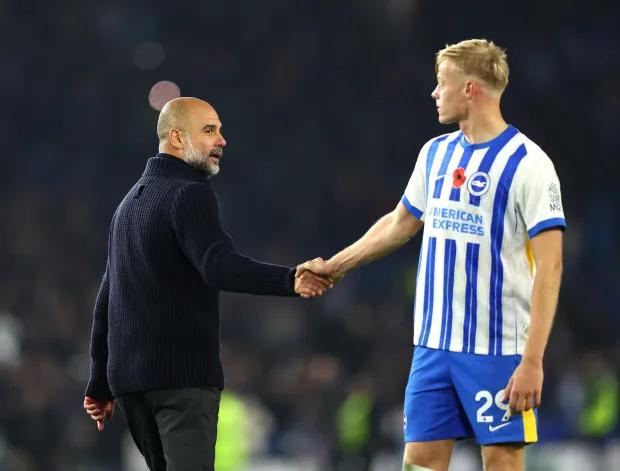
Pep Guardiola found himself at the center of intense on-pitch drama and managerial history on a day that Manchester City will want to forget. City’s 2-1 defeat marked Guardiola’s fourth consecutive loss for the first time in his illustrious career, stretching over 898 games as a senior manager. It also brought an end to an era of dominance for the reigning Premier League champions, marking the first time they have suffered four consecutive defeats since August 2006, when Stuart Pearce was at the helm.
Manchester City appeared on course to reverse their recent slump as Erling Haaland gave them the lead with a scrappy finish in the first half. Despite not being one of Haaland’s typical clinical strikes, his goal sparked hopes among City fans that their team’s recent woes would be halted. Unfortunately for the Sky Blues, Brighton had other ideas. The Seagulls roared back with goals from Joao Pedro and Matt O’Riley, leaving City stunned and adding another painful chapter to their faltering form.
For Guardiola, this losing streak has been uncharted territory. Throughout his career, first with Barcelona, then Bayern Munich, and now Manchester City, he has set the standard for relentless excellence. But the unexpected sequence of four consecutive losses has left many wondering whether City’s grueling fixture schedule and persistent injury issues have finally taken their toll. Guardiola himself appeared tense and frustrated after the final whistle, an emotion that boiled over during a confrontation with Brighton defender Jan Paul van Hecke.
The incident unfolded as the final whistle blew, with Guardiola approaching van Hecke, who had been involved in a heated exchange with Erling Haaland late in the match. The Dutch defender had tangled with Haaland in injury time, pulling the Norwegian striker to the ground in the penalty area. As van Hecke attempted to shield the ball, goalkeeper Bart Verbruggen collected it safely, but tensions flared. Haaland’s passionate reaction to the perceived foul led to a yellow card, sparking a chain of events that culminated in Guardiola’s post-match exchange with van Hecke.
Eyewitnesses described the exchange as intense, with Guardiola whispering something in van Hecke’s ear while holding onto his hand. The two initially tried to separate but ended up locked in conversation, refusing to let go of one another as they walked. While the exact words exchanged between them remain a mystery, it was clear that emotions were running high. The interaction highlighted the stakes and pressures Guardiola faces as he navigates this unprecedented period of difficulty with his team.
The confrontation between Haaland and van Hecke was emblematic of the growing frustration within City’s camp. The Norwegian goal machine, who is typically a symbol of ruthlessness and composure, found himself at odds with van Hecke and the referee’s decision. Haaland’s yellow card added another layer of disappointment on a day when he saw a personal record come crashing down: it was the first time in his career that he has lost a game after scoring, ending a remarkable streak that stretched over 46 matches.
City’s defeat also underscored broader issues within the squad. Guardiola, known for his tactical ingenuity and man-management skills, now faces a significant challenge in reenergizing his players and halting their slide. The loss to Brighton is not merely a statistical anomaly; it points to vulnerabilities that their rivals will undoubtedly seek to exploit. For a team accustomed to dominance, every defeat carries the weight of expectation, and four in a row is an unheard-of blow.
Despite the challenges, Guardiola’s competitive spirit remains undiminished. His post-match exchange with van Hecke, while uncharacteristic, may reflect a manager unwilling to let standards slip, even in the face of adversity. Over the years, Guardiola has built a reputation as a perfectionist who demands the highest levels of performance from himself and his players. The frustration evident in his exchange with van Hecke speaks to the weight of those expectations and his drive to rectify what has gone wrong.
Manchester City now face a critical juncture as they head into the international break. For many players, the time away from club duties may offer a chance to reset and refocus, while for Guardiola and his coaching staff, it represents a valuable opportunity to analyze their recent performances and find solutions. The fixture list will not get any easier, and the champions’ response to this adversity will define the trajectory of their season.
As Guardiola reflects on his first-ever four-game losing streak, questions will inevitably be raised about squad rotation, player fatigue, and tactical adjustments. But if there is one thing history has shown, it is that Guardiola is not one to back down from a challenge. The path forward may be difficult, but for City and their fans, there is hope that this rough patch will become a catalyst for future success.
The loss to Brighton, the heated exchange with van Hecke, and Haaland’s rare defeat despite scoring all paint a picture of a team at a crossroads. For Guardiola, the next steps will be critical—not just in terms of results, but in restoring the swagger and confidence that has made Manchester City one of the most formidable teams in world football.
Leave a Reply